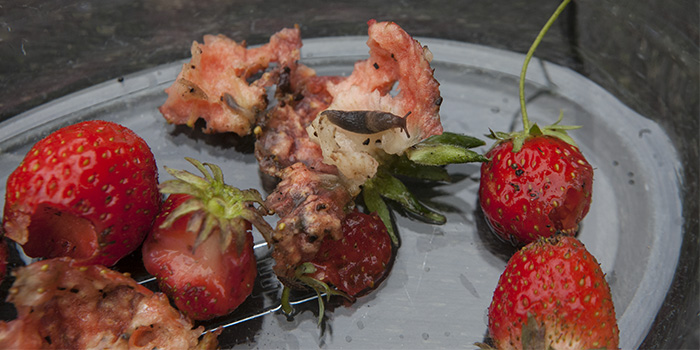In December 2018, the government decided to prohibit the outdoor use of metaldehyde, a pesticide used to control slugs in a range of crops and in gardens, as from Spring 2020. Why? Because the experts said that it poses an “unacceptable risk to birds and mammals”.
Slug damage – What do you think?
That decision has now been reversed after a High Court challenge from a chemical company, so we can legally carry on using the blue slug pellets for the time being.
So, should we leave it to the experts, the politicians and lawyers? Or should we on allotments make our own minds up about what’s the right thing to do?
Here’s the thing: most of us suffer from slug damage to our potatoes, greens, strawberries and so on. Sometimes where’s not much left once you’ve removed the damaged parts of your fruit and veg. The logic then is to find a quickfix solution – just go and buy some of those blue slug pellets and scatter them around in the hope that the slugs will eat them rather than the plants.
But are slug pellets a solution?
- when they don’t work anyway (not on our plot, they don’t)
- when they create more problems – long-term ones – down the line
So should we stop using the blue slug pellets? Because –
- The chemical in them could be killing the hedgehogs which eat slugs, and that doesn’t make sense. After all, these little nocturnal mammals are nature’s answer to slug control and they like beetles and caterpillars too.
- Hedgehogs and other wildlife which feed on slugs may eat the pellets themselves and even if that doesn’t poison and kill them, it will make them ill and probably interfere with their reproductive systems
- If we use enough pellets to really make a dent in the slug population, it’s also making a significant dent in the food supply for animals like hedgehogs which eat slugs, so affects their survival.
As with a lot of other human activities, our actions have knock-on effects on other animals and nature as a whole. Did you know that hedgehogs are now seriously threatened – their numbers have dropped 99% since 1950 to around half a million, and although a lot of hedgehog deaths are on the roads at night when they are active, we gardeners are probably also responsible for many deaths through slug pellets, using strimmers in places where hedgehogs are sleeping in the day, and leaving out wide mesh netting in which hedgehogs get tangled and die through dehydration.
What do you think?

Here’s what some hedgehog advocates say:
Should we care about hedgehogs? Even if we don’t care about them especially as creatures to share our land with, shouldn’t we think about our use of chemicals and what impact that has in all respects?
Hedgehog Street (www.hedgehogstreet.org/slug-pellets)
“It’s a complex topic, but in general any chemical treatment that kills slugs, snails or insects will be bad for hedgehogs and should be avoided.
The jury is still out on the effects that slug pellets have on hedgehogs. Metaldehyde is the active ingredient in most commercial slug pellets. Research shows that the amount a hedgehog would need to consume to be lethal would be a very large amount. This could be either directly from eating slug pellets or poisoned slugs. Fortunately, there have been a few cases of dead hedgehogs found to have had very high levels of metaldehyde in their system. Research on rats has revealed that slug pellets might affect their reproductive ability. Whilst they might not kill hedgehogs, this has a negative effect on their population.
Less hedgehog food = fewer hedgehogs
All things considered, to be truly hedgehog-friendly you need to stop using slug pellets or pesticides”
Garden Organic says: “Growers everywhere, whether in farms, allotments or back gardens face slug and snail damage. It’s probably the most disheartening sight. However, there are many ways to prevent and manage mollusc devastation when you are growing organically – without resorting to chemicals,” says James Campbell, Chief Executive. “Check out our useful video, and read our advice. We help you prevent slugs devastating your plants, as well as giving ideas on traps and barriers to keep slugs and snails at bay.”
If you have to resort to slug pellets, some are certified for use in organic growing (see The Organic Gardening Catalogue ). They contain ferric phosphate which will degrade harmlessly in the soil. However, these pellets also contain chemicals (used as chelators) which can be harmful to soil life. Use them sparingly, only 4 or 5 pellets per plant, and only occasionally.”


